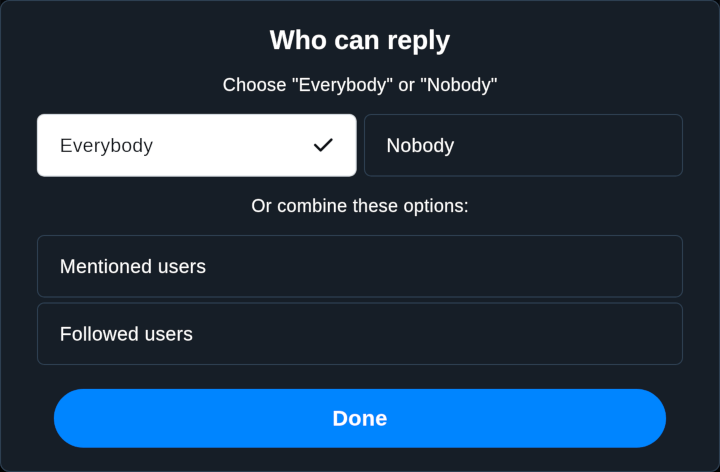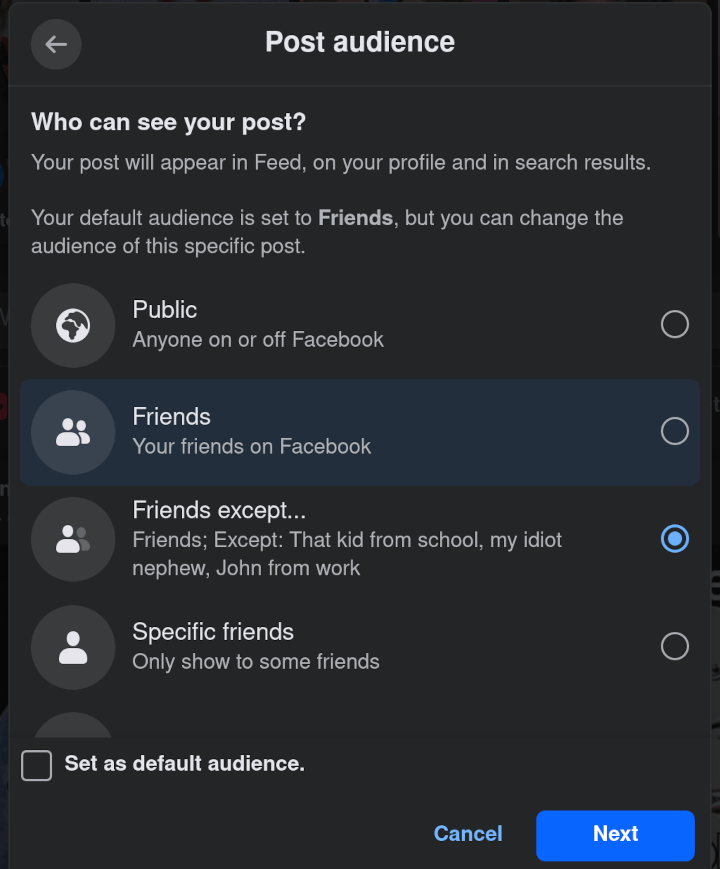Who can reply?
Vague thoughts as they enter my brainbox.
The BlueSky social network has introduced "Reply Gating" - it looks like this:

You can write your hot take on Taylor Swift and not be inundated by weirdos replying to you. Nifty!
This is nothing new. Twitter has it. Facebook has the concept of "audiences" to restrict who your post is visible to.

And, of course, blogging has this! There is a comment form at the bottom of this page - and I moderate it. If you post something stupid, I don't have to subject my audience to your inanities. I can (and do) block users from commenting.
ActivityPub doesn't have this (yet). It's much more like a public mailing list. I can block or mute you - which stops me from seeing your abuse - but doesn't stop anyone else from seeing it.
Should ActivityPub have something similar? Yeah, I reckon so. I'd like to be able to say "Anyone I know want to go to the pub tonight" and only have mutuals reply. I want to prune away spam or repetitive replies. It would be helpful to have a conversation in public that other people can't interrupt.
The UI would be complex. And the social model needs a bit of work. And there are some technical challenges around syndicating which replies should be included.
But, ultimately, social media should respond to the needs of its users.



@Edent Threads has it and so does #Hubzilla
hubzilla
@blog I worry deeply about misinformation once this gets implemented...😬
It's VERY easy to start a new instance and post seemingly normal things to gain a following. Anyone being able to post any bullshit they want, unchecked, will be a major issue if not quickly addressed.
@Edent sed 's/weirdos/people with different opinions/g' 😜
Semi-related: I wish the idea of circles hadn't lived and died with google+. I like the idea of having separate but partially overlapping areas of interest, groups of people, etc without needing to create entirely new accounts for each thing. Maybe something for fedi to eventually pick up...
@blog Well, one of the great things about the Open Web is that you can't prevent me from responding to you on my slice of it. That led to my commenting and debunking with evidence tens of thousands of SARS-CoV-2 misinformation posts from 2020 to 2022. Yes, that's sometimes more than one hundred a day. Most of them had response blocks on Twitter, but no one could ever stop me from responding to them on my server in the Fediverse.
I will always be able to respond to you, even if that flag is set on your server. Because mine does not have to honor it. My server is mine. So the only thing you will achieve is the same you do right now: you can prevent yourself from seeing my responses.
It's OK to police what you can see. It's not OK to wanting to police others. That path leads to cryptofascism and is the very antithesis of an open web. Even if we don't agree with it.
@mikka @blog
I think you might have misinterpreted my post.
You might still be able to respond - but people who follow me won't see your responses.
You will be shouting into the void. My server will not list your posts as replies to mine.
It is OK for individuals to set boundaries on the conversations they want to have. If you come up to me in a pub and start talking with me and my friends, we're under no obligation to include you. That isn't "cryptofascism"; that's society.
@Edent @blog Agreed. And that would mean that your server can block scientists or SARS-CoV-2 science or pro-Hamas or pro-Israel or whatever. If your server honors the "do not reply" flag, which it should, then, sure, your friends on your server won't see me.
However, your friends on other servers may or may not, depending on how that server handles me. Wanting your server to set the policy for mine or any other server, that would be cryptofascism. You're on mastodon.social. Due to its rampant COVID-19 misinformation in 2020 my server is soft-blocking yours. That's fine. If I were to tell xyz.something.com to block you, because I am, that'd be not fine.
If someone on xyz.something.com posts things I do not want to see, or responds to me in ways I do not appreciate, I can fortify my server against them. And I do. Telling mastodon.social to do the same, because it violates my sensibilities, that would not be.
Or to stay with your analogy: you're in a bar, and someone you do not like comes up and wants to talk to you. You tell them to fuck off. Great. Your friends in that bar agree with you. Great.
But you calling every other bar in your town to let them know that you do not want that person to talk (about you, or whatever), and making sure they are silenced everywhere, that would be overreach. Even your friends should be free to decide if they want to engage with that person. If Hans says "I'd like to speak to Marc about his concerns with your statement," you'd be an asshole to tell Hans "no, you can't." You don't have to listen, but you should not prevent it.
You have a right to not speak with me. That's absolutely cool. As soon as you want mechanisms to prevent others from engaging with me, or mechanisms that prevent me from confronting data and statements, that'd be uncool.
The Open Web is the solution, because it does not give Nazis or SARS-CoV-2 deniers or Transphobes or Islamists, or Homeopaths, etc. the right to speak without being fact checked and responded to. Your switch would create that right. And, frankly, the right to speak without being responded to, that's the kind of BS we criticize in the rich, the powerful, and the hateful every day. A toggle like yours would be a boon to them much more than it would be a boon to anyone else.
@mikka @blog
You are, of course, free to say whatever you want about me on your site.
I am under no obligation to link to your replies from my site.
@Edent @blog Again, 100% agreed. If you’re the administrator of your site, you have every right. If you’re a user of a site, I don’t think it’d be in the spirit of the open web if you told everyone there what they can read. And for the 1000s of other sites that may receive your or my content, I’d also rather err on the side of openness.
@mikka @blog
So if I am technically adept enough to run my own Fediverse server, I am allowed to protect myself.
If I'm not technically inclined, it is immoral to do so.
Got it, thanks!
@blog But…just to clarify your scenario: if you post to your friends only, only your friends can reply, right? But no one else will see it, right? Or is there a scenario where you publish it publicly, but only your friends can respond/interact with your post?
Another thing is that, currently, Fediverse services usually inherit the publishing level for the replies, though one can indeed tighten them up even further (I don’t think, but I do not know, if you can “open them up” further). But as it works today, if you post to followers-only, and I (who follow you) type my reply to you, also as followers-only, my followers will see my reply (as they follow me) but they won’t see your original post (unless they also follow you).
Wouldn’t it make sense that if Terence posts to followers only, and his followers replies, that the replies would be visible to Terence’s followers only, not the followers of whoever replied?
@m @blog
The conversation can happen in public - so everyone can see it. But only specific people are allowed to reply.
This is quite normal on other social networks. My Facebook posts are visible to the world - but I only want my friends to be able to comment on them.
As I say, the mental model for most people will need updating. The UI will need to be carefully designed. But it's clear that pruning out unwanted replies is a feature that lots of people want.
@Edent
Mmm…you say “can”. I’m thinking we should consider if it “should”. I predict a lot of spammy broadcasting posts otherwise. People can obviously sift by chosing not to follow those accounts but…
It would make sense to be able to control the audience of a post, that indeed seems to be a requested feature, but personally I fail to see why I should be able to broadcast to “everyone” and then just pick a handful of people who can interact with my post.
The other way around, I am thinking if I limit who can interact with my post, it should also only be delivered to those people. It kind of “comes with the deal”. It also sounds rather fair (which obviously will be the main reason to why it’ll never happen).
To me, the general rule would be: “if you can read it you can interact with it”.
But that is me. 😄
@blog
@m @blog
I suggest spending some time posting as someone other than a straight white guy and see if your opinion changes.
Personally, even with my privileged, I get plenty of spammy / irrelevant / abusive replies. I've love a way to prune those out.
@Edent
Good point.
However, still, I am thinking there can be different publishing levels that can be selected at the time of posting. They don’t have to be mutually exclusive as options.
If I follow you and I sit in Sweden (as I do) and you post that you’re going to the pub and set the reply allowance to “followers-only”, I fail to see the value (for either of us) in me even seeing that post, not because I don’t wish for you to not go to the pub when I can’t.
@blog
@m @Edent @blog Sorry, if I may butt in, --
"if you can read it you can interact with it"
Recently I started to look for parallels between personal websites, and social media profiles, to approach certain topics and challenges.
For instance, when people ask to be able to control how their public posts are used, which is typically met with dismissals ("if it's public, anyone can do anything with it"), I think of robots.txt.
@m @Edent @blog In the case of being able to respond to public posts, you have blogs or news sites that either ask you to log in to comment, or don't allow commenting at all.
And forums can set limits for who can reply or start threads based on how old your account is, your "reputation", and other rules.
@stefan
All true. However, I am thinking that Social Media is different than a news web site (say, The Guardian) or a broadcasting site (such as my blogs) in general. With the risk of sounding flippant: if broadcasting without interaction is what someone is wishing for there’s a multitude of solutions out there.
To your point though: I have been thinking more than once here in the Fediverse that some people/groups here probably would be better served running their own community-forum(s) or similar, instead of trying to shape a social media platform, and all its users, in to a forum.
Having said all of that: we don’t have to implement all the bad solutions out there in this “new” Fediverse. We could focus on doing the bad things correctly instead, instead of immediately mirroring all the bad things from everywhere else.
@Edent @blog
@m @Edent @blog Well, I don't expect to convince you, just wanted to provide a different perspective.
I think the lines between different kinds of online spaces are starting to blur thanks to the fediverse.
You can add ActivityPub support to your WordPress blog, to a Discourse forum, and soon to newsletters hosted on Ghost.
Some of our expectations might start to shift.
More comments on Mastodon.